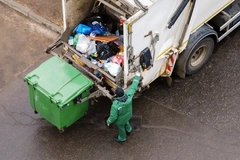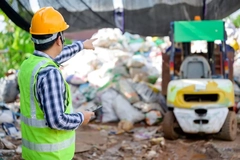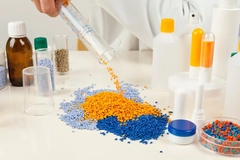New York packaging bill: Over 100 corporations lobby against plastic pollution regulation
Key takeaways
- Over 100 businesses lobbied against New York’s Packaging Reduction and Recycling Infrastructure Act, despite strong public support.
- The bill seeks a 30% reduction in single-use plastics by 2035 and introduces regulations to reduce harmful chemicals in packaging.
- The report highlights the significant political and financial pressure from lobbyists, which has stalled the bill’s passage in the state legislature.

A recent report from Beyond Plastics has revealed that in 2025, over 100 businesses lobbied to block the New York Packaging Reduction and Recycling Infrastructure Act (PRRIA) in the US, reportedly outnumbering supporters of the bill by four to one.
The report, “Follow the Money: The David vs. Goliath Battle to Pass the New York Packaging Reduction and Recycling Infrastructure Act,” claims that companies, including ExxonMobil, Dow, Shell, McDonald’s, and Coca-Cola, are lobbying in opposition to the PRRIA.
The bill mandates a 30% reduction in single-use plastic over a 12-year period, with efforts to improve reusable and recycled content by 2052. It would also regulate harmful chemicals in packaging, exclude chemical recycling from recycling definitions, and introduce EPR legislation.
“We saw firsthand the sheer number and influence of bill opponents in the halls of the state legislature in Albany. This is the most lobbied bill we’ve ever witnessed in the New York state legislature,” Melissa Valliant, communications director at Beyond Plastics, tells Packaging Insights.
In 2025, the New York State senate passed the PRRIA, sponsored by Senator Pete Harckham. In the assembly the bill, sponsored by Assemblymember Deborah Glick, advanced through four committees but has not yet been brought to a floor vote.
Industry opposition
The bill is facing industry opposition because it does not factor in spending implications for businesses. The Business Council of New York, which represents nearly 40 businesses across the state, advocates for legislation that “creates a workable approach to increasing the recycling of post-consumer packaging and paper products, diverting materials from disposal, and promoting the reduction and reuse of products.”
.webp) Corporate lobbyists outnumbered supporters of PRRIA by four to one, according to the Beyond Plastic report.In April, The Business Council of New York State supported an alternative packaging waste reduction bill that fits the needs of businesses.
Corporate lobbyists outnumbered supporters of PRRIA by four to one, according to the Beyond Plastic report.In April, The Business Council of New York State supported an alternative packaging waste reduction bill that fits the needs of businesses.
Beyond Plastics argues that the PRRIA has been disrupted by lobbyist opposition, even though concessions have been made to suit business needs, such as reducing the target for single-use waste from 50% to 30% over a 12-year period.
Blair Horner, legislative director at New York Public Interest Research Group, says: “This report illustrates a classic story of power politics where the wealthy and powerful use their immense resources to block what’s in the public’s best interest and to maintain an inadequate status quo.”
Lobbying efforts
Despite a Siena poll showing that 72% of registered voters in New York support the bill, the report revealed that the Packaging Reduction and Recycling Infrastructure Act was the first and second most lobbied bill during the final two months of the state legislative session.
It also revealed that many of New York’s top-paid lobbying firms were hired to fight the bill, with only one lobbying firm in favor.
Judith Enck, president at Beyond Plastics, explains that lobbying firms in New York state have to report on the bill number they are working on, not their position. Beyond Plastics examined public statements, media comments, and memos of these firms (and the companies they represent) to determine if they opposed or supported the bill.
The report found that 107 registered companies and organizations lobbied to defeat this bill, and 23 registered organizations worked to pass it.
Status quo “not acceptable”
Enck says the bill could change solid waste management in New York and help protect its citizens against toxic chemicals and microplastics.
She adds: “The status quo means New York landfills are filling rapidly. Garbage incinerators that operate mostly in environmental justice communities are polluting our air, including releasing GHG. Tax dollars are spent disposing of single-use plastics that can’t be reused or recycled.”
.webp) Special interest groups do not want to be responsible for the waste they produce, argues Horner.She argues that microplastics in the human body — discovered in the lungs, kidneys, placenta, breast milk, testicles, and brains — are of serious concern.
Special interest groups do not want to be responsible for the waste they produce, argues Horner.She argues that microplastics in the human body — discovered in the lungs, kidneys, placenta, breast milk, testicles, and brains — are of serious concern.
Horner also says that New York State is facing a solid waste crisis. He explains that in 2023, the Department of Environmental Conservation (DEC) released its solid waste management plan to tackle the issue.
“It’s not just me or Judith who thinks there’s a solid waste crisis in New York. The DEC agrees, and in their report, they identified that landfills are filling up and the disposal of solid waste is going to be a big problem.”
However, the DEC efforts to tackle the problem are being blocked by “powerful special interest groups that don’t want to be on the hook for coming up with ways to reduce waste or to change their business models.”
Special interest groups invest money to hire firms that create confusion so that a bill cannot pass, says Horner. He adds that it’s a common tactic used in industry groups, such as those representing tobacco and oil production.
Lobbying reforms
During the May 2025 Senate floor debate, the bill’s sponsor, Pete Harkham, stated: “This is Washington, DC-level of money being spent to defeat this bill.”
Enck acknowledges the report’s limitations, including its lack of detail on the amount of money companies spent lobbying for the bill.
She explains: “In this report, we look at the number of lobbyists, but we do not include the millions of dollars spent defeating this bill due to the way lobbying expenses are reported. If you are a lobbying firm reporting your expenses, it’s for every bill you lobby on, not just one.”
“A big firm may be lobbying on dozens of unrelated bills, and there’s no way to tease out precisely how much was spent on each bill.”
Enck points to the other methods that “money can buy,” which include political campaign contributions and advertising. She points to a New York Focus report that revealed that the American Chemistry Council (an opponent of the bill) spent US$250,000 in the past year on an election ad campaign targeting this bill.
Political pressure
The bill will return to the assembly floor next January. Enck calls for it to be voted on early in the legislative session, “not left to the last night of session, which has been the case for the last two years.”
Enck also notes that 2026 is an election year, adding that “New Yorkers will be watching the progress of the PRRIA.” The bill has 78 co-sponsors in the state Assembly and 32 co-sponsors in the state Senate. It needs 76 Assembly and 32 Senate votes to pass on both floors.
.webp) The bill will start on the assembly floor again next January.“The big question is, will these state legislators pass a transformational bill like this one, or will they buckle under the political pressure of special interest lobbyists and the immense number of lobbyists identified in this report?”
The bill will start on the assembly floor again next January.“The big question is, will these state legislators pass a transformational bill like this one, or will they buckle under the political pressure of special interest lobbyists and the immense number of lobbyists identified in this report?”
Horner concludes that public interest suffers if the bill continues to be lobbied against.
“Dumps continue to fill up. Taxpayers continue to get dunned to cover the waste disposal costs. As a result, we hope this report will illustrate the power dysfunction in Albany and lead to action in the state assembly and the state senate this upcoming session.”










